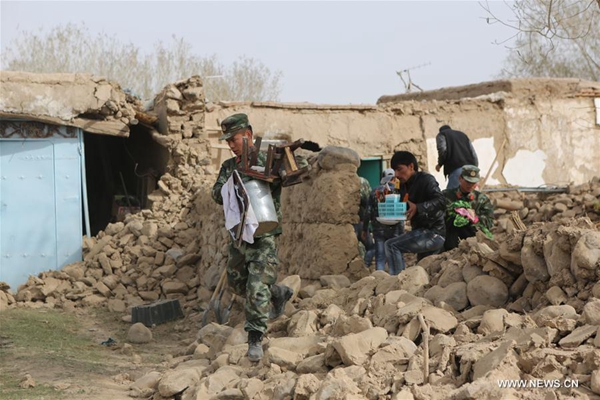Interview with Samantha Armytage, Sunrise
SAMANTHA ARMYTAGE:
Malcolm Turnbull joins us in the studio this morning to talk all things Budget, Prime Minister good morning.
PRIME MINISTER:
Good morning.
SAMANTHA ARMYTAGE:
Welcome. Let’s get straight into it. You’ve said repeatedly over the last few days that better times are ahead. Average Australians are getting hit with taxes, there’s banks and Medicare levies to come, high school fees, increased uni fees, why should we be happy?
PRIME MINISTER:
Well because what we’ve delivered is a fair Budget. It’s going to guarantee the National Disability Insurance Scheme, so we’ll be able to say to every mum and every dad of a child with a disability: “You can be assured the support will always be there for you.” Labor left the Disability Insurance Scheme unfunded and we’re fixing that. You know, Mr Shorten has given a very political speech last night but we call on him to support what we’re doing with the Disability Insurance Scheme and give parents, disabled children and of course adults, whether they’re young or older, to ensure that they get the support they need.
SAMANTHA ARMYTAGE:
A Sunrise Facebook poll, a Sunrise Facebook Poll suggested most people feel they’ll be worse off under this Budget. 20, 71 per cent say they feel like they’ll be worse off – that’s a huge majority. Is it fair to say it hasn’t been well received?
PRIME MINISTER:
Well I believe it has been well received because Australians know that this is a fair Budget. It guarantees fair needs-based school funding right across Australia. It guarantees Medicare and the Pharmaceutical Benefits Scheme and it guarantees the funding for the National Disability Insurance Scheme. And at the same time as it does all of that, it puts $75 billion into the infrastructure we need for the future, including Snowy Hydro, including the Inland Rail, including the Western Sydney airport. It also brings the Budget back into balance, so by 2020/21 we’re $7.4 billion in surplus. That again is fair Sam, because what it means is, we’re not throwing a mountain of debt onto the shoulders of our kids.
SAMANTHA ARMYTAGE:
It was a very, very Labor looking Budget. What do you say to the core Coalition voters today? Even Bill Shorten struggled to find something to criticize. He’s focusing on company tax because that’s about the only core Liberal thig in this Budget.
PRIME MINISTER:
Well Sam, I disagree with that, the core Liberal value is competent economic management. Now we’ve made a lot of savings from Labor’s reckless spending. We’ve saved about $25 billion. We would have liked to saved more but we can’t get them through the Senate.
SAMANTHA ARMYTAGE:
By taxing everything.
PRIME MINISTER:
No by reducing spending. But what we need to do is live with the Parliament the Australian people elected.
SAMANTHA ARMYTAGE:
I saw a lot of spending in this. After Scott Morrison has said to us, he sits here often, and he says: “We need to tighten our belts, we can’t stop spending on the never-never.” And then he brings down a Budget that is high, high spending.
PRIME MINISTER:
Well actually spending is coming down to very close to the long term average. We’re getting it back down; it was down to 25 percent. So we have been, spending has been growing at a much more restrained pace than it was under Labor and the rate we inherited. So we have slowed the growth in spending.
But Sam, you know, the reality is we are, you know, the population is getting older. We need to spend more money on Pharmaceutical Benefits and Medicare. We’ve got to make sure that our kids get the great education they need, so we’re focused on having a fair distribution of resources, needs-based, consistent. Bill Shorten did 27 secret deals. We’re implementing David Gonski’s vision of fair, needs-based school funding across Australia and at the same time, we’re making sure they get the quality education they need. So we get the right outcomes.
SAMANTHA ARMYTAGE:
Alright. Now taxing the banks, I guess, sounded like a nice idea at the time. They are now saying, they’re not even hiding the fact, they are outright saying they will pass on this levy to customers – which is all of us – through increased interest rates and I guess increased fees on accounts. It hasn’t really worked, has it? This idea to tax the big banks?
PRIME MINISTER:
We will raise $6 billion over the forward estimates. The banks –
SAMANTHA ARMYTAGE:
But we will have to pay for it, the banks won’t absorb this.
PRIME MINISTER:
Well Sam, we will see. Let me make a couple of points. Firstly, this is a relatively small cost compared to their $32 billion of profits.
SAMANTHA ARMYTAGE:
But they said they won’t wear this.
PRIME MINISTER:
Let me just go on. They are in a competitive environment. There are other banks that are not subject to the levy that will be able to compete with them. So if people feel that you know, Westpac or the Commonwealth is charging them too much, they can take their business somewhere else.
SAMANTHA ARMYTAGE:
But all the big banks are going to do this, so there isn’t another bank to go to.
PRIME MINISTER:
No, no hang on.
SAMANTHA ARMYTAGE:
Most people don’t trust particularly trust credit unions particularly if there was say another GFC or something.
PRIME MINISTER:
Well there are many smaller banks. I mean you’ve got Bendigo Bank you’ve got Suncorp; I mean it’s not as though the –
SAMANTHA ARMYTAGE:
So if all Australians left the big banks and we all went to the credit union, then we don’t have a strong banking industry. Then we’re really in trouble.
PRIME MINISTER:
Sam, you shouldn’t run up the white flag and surrender to the banks. They are the most profitable banks in the world. They benefit from the stable system that we have –
SAMANTHA ARMYTAGE:
I understand that.
PRIME MINISTER:
It’s only fair that they pay their share and they can afford it. They don’t have to hit their customers for it, they know that, their customers know that. The ACCC will be monitoring it, and there is competition in the marketplace.
SAMANTHA ARMYTAGE:
Okay, how can the ACCC stop this? Stop them passing it on to us?
PRIME MINISTER:
What the ACCC can do is scrutinise what they say and scrutinise and make sure –
SAMANTHA ARMYTAGE:
Is that enough?
PRIME MINISTER:
Yes, because what the challenge always was with banks, is that they claim to be passing on costs and are either are passing on costs that don’t exist, or passing on more than the costs incurred. So they need to be held to account.
I have to say you know the big stockbroking firms, who comment on the banks, a number of them have said that they do not believe they will be able, effectively, to pass on this cost. So that’s been the opinion, you know Citibank is one of the big broking firms made that observation.
Look, we will see. But I can assure you, competition, ACCC, and at the end of the day, they have got to start delivering the service and earning the confidence of their customers and as I said, they are the most profitable banks in the world.
SAMANTHA ARMYTAGE:
Yes, we know that.
PRIME MINISTER:
Oh, you know that?
(Laughter).
SAMANTHA ARMYTAGE:
We know that, but they got that way by being pretty ruthless. So it concerns me and all Australians that they will do that again in this scenario.
PRIME MINISTER:
Well, this is a very fair contribution that they’re making and if they try to take it out on the customers, their customers will react very negatively towards them. They will find those customers leaving.
SAMANTHA ARMYTAGE:
Okay, alright, last night Bill Shorten gave his budget reply speech in the House and it was watched on by his wife, Chloe. She started the night – I want to get your thoughts on this Prime Minister – she started the night wearing a gold jacket and a gold necklace. And throughout the speech, she removes the necklace. Now there are reports in the newspapers this morning that your MPs thought she took that necklace off during Mr Shorten’s speech about battlers and being from Moonee Ponds. Do you know if that is true?
PRIME MINISTER:
I don’t know. To be honest, I wasn’t you know – I’ve seen the pictures of Mrs Shorten there, but I was paying attention to the speech.
SAMANTHA ARMYTAGE:
Okay, alright.
Now News Corp is reporting this morning. Let’s talk about Australia’s most notorious Islamic terrorist Neil Prakash. He could face a Melbourne court within 12 months. Do you believe his extradition from Turkey where he is in jail, will actually happen?
PRIME MINISTER:
Yes, yes we do. We have an extradition treaty with Turkey. It’s just as well we do, because otherwise we wouldn’t be able to get him back and ensure that this man faces justice in Australia.
SAMANTHA ARMYTAGE:
Do you know what sort of time frame we’re looking at there?
PRIME MINISTER:
We’re looking forward – we should be getting him back within months, but it’s obviously got to go through the Turkish processes but we do have an extradition treaty. We are satisfied that Neil Prakash, who has been one of the key financiers and organisers in ISIL or Daesh, this barbaric terrorist group that we are determined to destroy Sam, both in the Middle East and around the world. That he has been one of the key figures there and he will be brought back to Australia and he will face the courts.
SAMANTHA ARMYTAGE:
Okay, sounds good.
Before we go something a bit lighter. Mother’s Day on Sunday. Something a lot lighter. Anything planned for Lucy?
PRIME MINISTER:
Well we are going to have – Yeah we do
(Laughter)
SAMANTHA ARMYTAGE:
You sit up in your seat when we talk about Mother’s Day.
PRIME MINISTER:
Yeah I do, I’m always happy to talk about Lucy and mothers. No, we’re going to have a Mother’s Day lunch, actually tomorrow. We’re going to have an early one to meet the various family members travel plans. So we’ll be doing that, so it’ll be a nice Mother’s Day lunch with grandchildren running around being mischievous.
SAMANTHA ARMYTAGE:
Lovely. Sounds gorgeous.
PRIME MINISTER:
Baby Alice is starting to do the commando craw you know.
(Laughter)
SAMANTHA ARMYTAGE:
Look, now we can’t stop you talking. You weren’t talking like this when we were talking about the banks. That’s how should talk about your grandchildren.
PRIME MINISTER:
Yeah, babies are more fun than banks.
SAMANTHA ARMYTAGE:
I bet they are! Alright Prime Minister, lovely to see you thank you for your time
PRIME MINISTER:
Great to see you.
[ENDS]

